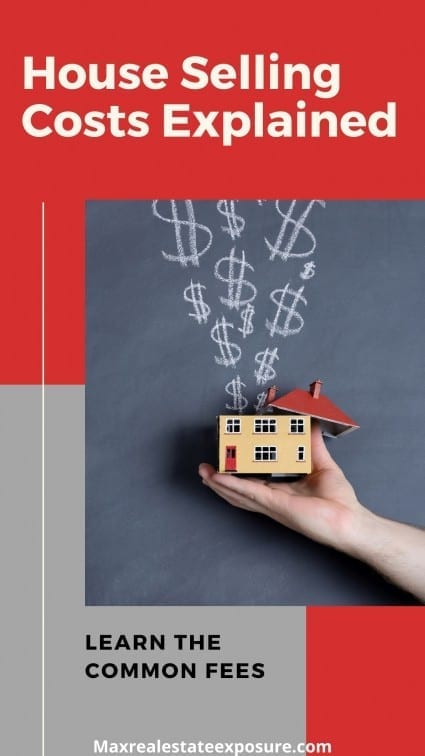How Much Are Closing Costs For a Seller?
 Do sellers pay closing costs? What are the costs of selling a home? What are the seller’s closing costs? How much are closing costs? These are all common questions first-time sellers will ask.
Do sellers pay closing costs? What are the costs of selling a home? What are the seller’s closing costs? How much are closing costs? These are all common questions first-time sellers will ask.
Most homeowners will want to have a rough idea of the closing costs and associated expenses when selling their property.
If you are selling your house for the first time, you may not know what the seller’s closing costs will be.
One of the questions that real estate agents often get is who pays what in closing costs or who pays closing costs a buyer or seller.
As a home seller, you will have to pay various closing costs when you finalize the sale of your home.
These home selling expenses vary by region and can range from affordable to quite expensive – so you must understand what your obligations are likely to be before you move forward with your sale.
The most common closing costs for a seller include:
- Real Estate Commission
- Transfer tax
- Escrow fees
- HOA fees
- Attorney’s fees
- Prorated property taxes
- Credits towards closing costs
- The outstanding amount owed on the property
We will detail each of these closing costs for a seller. We will also cover some closing costs that could be paid for by the buyer or seller.
What Are The Average Closing Costs For a Seller?
A home seller’s average closing costs is between 8-10 percent of the home’s sale price, including commission.
The most significant closing cost a seller will pay is the real estate commission. Real Estate commissions make up the largest portion of the typical closing costs for a homeowner.
Commissions are what a Realtor makes in a transaction. They also account for almost all of their yearly earnings.
There are other charges involved with selling a house you may not know about.
It can be upsetting to be at the edge of transferring your property ownership, only to be surprised by different fees.
Avoid such surprises by learning about the expected home selling costs for sellers and talking with your agent about what your specific seller closing costs are likely to be.
Understanding who pays specific closing costs is worth knowing as it will likely be some serious money to overlook.
Who Pays The Closing Costs, The Buyer or Seller?
A common question that real estate agents field is whether the buyer or seller will pay closing costs. The answer is both.
Most of the closing costs associated with buying a home are centered around getting a home loan.
When purchasing a home, a buyer will pay quite a few loan fees that all mortgage lenders charge.
These costs include loan application fees, loan origination fees, title fees, attorney fees, credit report fees, title search fees, and a title insurance policy.
There will be a mandatory charge for a lender’s title insurance policy and an optional charge for an owner’s title insurance policy. The additional fees associated with an owner’s title insurance policy are worth every penny if you have a title issue. We will cover this a bit more in detail later.
A buyer could also pay discount points unless they go with a no points-no closing cost loan. By law, a home buyer must receive a loan estimate from their lender that details all the costs of buying a home.
A mortgage lender must also give a home buyer a closing disclosure. Closing disclosures outline all of the costs a borrower will have, along with the type of mortgage chosen and your projected monthly mortgage payments.
Financial institutions must give a home buyer the disclosure three business days before closing on the mortgage.
Home sellers’ closing costs consist primarily of real estate agent commissions and paying a real estate attorney to negotiate a purchase and sale agreement and attend the closing.
There are other miscellaneous seller closing costs we’ll go over as well.
Sellers Sometimes Pay a Buyer’s Closing Costs
The typical closing costs when selling a house can sometimes include some of the fees a buyer pays. Part of negotiating a real estate contract could include what are referred to as seller concessions.
A seller concession is when the seller pays some of the buyer’s closing costs for them. When you sell your house in a buyer’s market, it is more likely you will be asked to contribute towards paying some of a buyer’s purchase costs. It is much less likely in a robust seller’s real estate market where bidding wars are possible.
A buyer is more apt to ask for seller concessions when VA loans are involved. A VA mortgage is a loan type that requires no-down payment. Buyers consistently ask sellers to pay for their closing costs so they are not taking money out of their pocket.
In many real estate transactions, the seller is not really paying for the closing costs as the purchase price is increased to match the seller’s contribution.
For example, A home could be listed at $300,000, and the buyer offers $305,000, with the seller paying $5000 of the buyer’s closing costs.
The seller, in this instance, is still selling their home for their asking price.
Let’s take a closer look at how much closing costs are for a seller.
Seller Closing Costs – What You Need to Know
Home sales are significant financial transactions where a lot of money is at stake – which is why they are so carefully regulated and require so many steps to complete.
You want to be as confident as possible that you can walk away without any more concerns once you sell your house. Understandably, a seller would want to wrap their head around how much it costs to sell a home.
In fact, most buyers and sellers want to know who pays what in closing costs.
Let’s look at the basics of selling closing costs, including the common ones you are likely to run into, so you can close your sale confidently.
What Exactly is “Closing”?
When you close a home sale, you go through transferring documents and money between the buyer and you so that you both fulfill your obligations as defined by your sales contract.
The home closing process includes having you pay off all of the loans on your home so that the title is clear and having the buyer transfer you the money so that the balance owed on the property is paid off.
The buyer typically will have had earnest money held by either your real estate company, attorney, or title company. The earnest money was security they would perform under the terms of your contract.
This closing process is handled by a title company, the buyer’s lender, and an attorney. Title companies ensure that all the documents and money are appropriately exchanged, so it goes off without a hitch when you get to the closing table.
Real Estate closings typically happen 30-60 days after a purchase agreement is signed, although sometimes a longer date is negotiated by one of the parties.
What Are Seller Closing Costs?
 Closing costs when selling a house are pretty straightforward.
Closing costs when selling a house are pretty straightforward.
You know about the real estate broker commissions that have been agreed upon. You will pay the listing agent you hire and the buyer’s agent – typically between 2%-3% for each agent.
The other way the commission could vary is if you are selling as a for sale by owner and only pay a buyer’s agent or go with a flat fee MLS entry-only agency.
Your selling closing expenses in these situations could be lowered.
Closing costs are all the other fees needed to finish the sale, although depending on who you ask, some will tell you that closing costs include the agent commission.
For our purposes, we will consider closing costs all the fees incurred in addition to the commissions.
In general, the total costs for closing a home sale after agent commissions range between 1% and 7%. However, you only pay around 1% to 3% as the seller.
Depending on where you are selling your home, there are various fees that you could wind up paying as the seller.
Seller closing costs could also vary if you sell a condo vs. selling a home or selling a home in a community with a homeowners association (HOA).
Title insurance and appraisal fees are potential closing costs for a seller, but it’s far more likely the buyer will pay them. Again, who pays the closing costs could vary slightly from state to state.
Let’s review some of these sellers’ closing costs more thoroughly.
Title Insurance – Around $1,000-$4000
The cost of title insurance varies from state to state and is based on the property’s sales price. First American Title offers a nifty title insurance calculator to help figure out the cost. Finding out that there is a problem with the title of the home you sold them could be a massive headache for the buyer.
There are two types of title insurance policies. One is called a lender’s insurance policy, and the other is called the owner’s policy. The lender’s title insurance will be found in all transactions involving a lending institution. The owner’s title insurance, on the other hand, is optional.
As a real estate agent, I always recommend buyers have title insurance. If something goes wrong, like if someone else can come in and claim that they own the home, the buyer will have an insurance policy to cover their legal costs.
Title insurance offers protection from someone else who can claim ownership over the property, either because of a dispute over the property or because of unpaid liens from contractors, credit institutions, or even the government. Of these three, outstanding liens are not that uncommon.
Again, title insurance is not a typical seller closing cost.
Appraisal – $450 to $650
 Most of the time, the buyer will be the one paying for the real estate appraisal. But there are times when you might wind up paying for the appraisal, such as if you are in a buyer’s market and you really need to sell your home. If all it takes is paying for the appraisal, you might want to do it.
Most of the time, the buyer will be the one paying for the real estate appraisal. But there are times when you might wind up paying for the appraisal, such as if you are in a buyer’s market and you really need to sell your home. If all it takes is paying for the appraisal, you might want to do it.
The appraisal determines the current market value of the home. The appraisal is critical because the buyer’s mortgage depends on it – if your home appraises for less than the amount the buyer offered you for the home, the lender won’t hand over the money. So you want an appraisal that hits somewhere near the buyer’s offer.
Sometimes fighting a low appraisal is necessary if there is a blatant mistake on the appraiser’s part. Most of the time, fighting an appraisal is not successful.
If you need to challenge the appraisal, it could become a seller’s closing cost transferred to your side of the ledger. Paying the fee will certainly be worth it if you hope to keep the buyer in the sale.
Transfer Tax – Highly Variable Cost
Transfer taxes are one of the most significant seller’s closing costs besides a commission.
Sometimes called a title fee or government transfer tax, this is the tax amount that you will pay when the home’s title transfers from you to the buyer.
The amount of the tax is determined by state law, so it depends on your state’s laws whether you will pay a little or a lot. The transfer tax for a median-priced home in Denver is $36, while it is $8,654 in Seattle.
In Massachusetts, this fee is what’s referred to as a tax stamp. It amounts to 4.56 for every thousand in the home’s purchase price. So, if you sell a $400,000 home, you will pay $1824 for the privilege of selling your home. It is one of the most significant fees in transferring property.
You will definitely want to research this fee now before you close the sale. As far as closing costs for a seller go, this is one if often unexpected.
Homeowners often find out about this seller’s closing cost at the last minute and are very disappointed.
HOA Fees – Variable
Whatever fees you owe up to the closing date will need to be paid for you to transfer ownership of the property. You may also find that you need to pay a transfer fee to your HOA to transfer the property.
One of the more common expenses for a person selling a condominium is what’s referred to as a 6D certificate. The 6D tells the buyer and their lender that you do not have any outstanding condo fees owed to the association.
In other states, the 6D may be called something else.
Attorney’s Fees – Variable
Another common closing cost for a seller is lawyer fees. Depending on the state you are selling your home in, you may be required by law to hire a real estate attorney to oversee the sale.
Even if you are not required to hire an attorney, you may want to do so if you make a complex transaction, like purchasing a foreclosure or dealing with inherited property.
You can expect to pay somewhere between $400 and $1200 for an attorney to review documents and attend the closing on your behalf. A selling closing cost that is well worth it to protect your interests.
Washington D.C. and 21 states typically see an attorney handling a real estate sale. These include:
- Alabama
- Connecticut
- Delaware
- Florida
- Georgia
- Kansas
- Kentucky
- Maine
- Maryland
- Massachusetts
- Mississippi
- New Hampshire
- New Jersey
- New York
- North Dakota
- Pennsylvania
- Rhode Island
- South Carolina
- Vermont
- Virginia
- West Virginia
Some sellers will try to save money by not using an attorney. A big mistake! An attorney is the best insurance policy for protecting your best interests in a real estate transaction.
Having been in the real estate industry for the past thirty-four years, I would never recommend a seller avoid this seller’s closing cost. Using an attorney to protect your interests in the sale is the best money you could ever spend.
Prorated Property Taxes
 Another seller’s closing cost is paying a portion of the property taxes. As a property owner, you must pay property taxes yearly. How much you pay will vary widely depending on your home location.
Another seller’s closing cost is paying a portion of the property taxes. As a property owner, you must pay property taxes yearly. How much you pay will vary widely depending on your home location.
When you sell your home, you will be expected to pay the property taxes accrued to the closing date. The property taxes after the closing date will be the buyer’s responsibility.
Quite often, buyers will find their assessed value being adjusted by the local government after the sale. More often than not, the taxes will go up in the calendar year after your purchase. Sometimes the increase in taxes is not justified.
You may find yourself in a position where you’ll need to challenge the high tax bill.
Credits Towards Closing Costs
If you sell in a market where buyers have the upper hand, you may have to offer them something extra to encourage a sale. Many sellers decide to offer to pay some of the buyer’s closing costs in this situation. They are often referred to as closing cost credits.
If you pay a portion of the buyer’s closing costs, you will do so at the closing. Ensure you don’t forget about this closing cost because it probably won’t be a small amount of money.
Outstanding Amount Owed on The Property
You could have any number of costs associated with the ownership of your houses, such as dues for your HOA, utility bills, homeowners insurance, and other fees.
Home sellers must take care of all of these obligations before transferring the property to the buyer.
If you are uncertain about which fees apply in this situation, ask your real estate agent. They can help you figure out all your applicable costs and determine what your final bill will probably look like.
Escrow Fees – $500 to $2,000 or 1% of Sale Price
In some states, escrow accounts are held by a third-party escrow company that protects the buyer and seller, keeping them from escaping with the other’s money. The escrow account for your home’s sale will hold the money from you and the seller related to the transaction.
Once the legal documents have been squared away, the money will be used to pay fees and other costs. Escrow and earnest money should not be confused with a buyer’s down payment.
The escrow fees are split between you and the buyer, usually 50-50.
Part of a real estate agent’s job description is calculating a seller’s closing costs. This is known as a net sheet. Preparing this for an owner helps them better understand their selling closing costs.
Seller Closing Costs Calculator
If you want to get a rough idea of your closing costs, use this calculator to help pinpoint your selling costs. By filling in the required information, you’ll get a decent handle on how much your total closing costs will be.
It will help calculate sellers closing costs, but double-checking the information with your Realtor or attorney will be a good idea.
Other Closing Costs For A Seller
While there are numerous seller’s closing costs, there are also other house selling expenses you will need to remember that will take place outside of your closing.
Keeping tabs on these additional costs will be especially important to ensure you get your house tax deductions once April rolls around. One of the significant tax benefits of homeownership is the exclusion of real estate capital gains.
Additional home selling expenses to plan for include the following:
Moving Expenses
Moving expenses – Anyone who has moved before knows how expensive it can be, especially if moving across the country. You will pay a moving company thousands of dollars and a moving tip if they perform up to your expectations. It can still be expensive even when you try to save on costs and rent your own moving truck.
Home Improvements
Home improvements – did you make any significant improvements to your home? Ensure you figure out what they are, as they can potentially bring down your tax bill. Even if there are no deductions, you’ll want to have a handle on the necessary expenses to get your property ready to sell.
Home Inspections
Home inspections – sometimes, sellers will decide to do a home inspection of their property before putting it on the market. Hiring their own home inspector prevents surprises and allows a seller to make necessary repairs to avoid scaring a buyer away from purchasing. You can expect to pay somewhere between $400 and $1000 depending on your location and the house’s size.
Loan Pre-Payment Penalty
Pre-payment loan penalty – while not all that common in today’s mortgages, you need to make sure there isn’t a prepayment penalty with your mortgage.
Don't forget about these common home selling expenses!Click To TweetTalk to Your Agent Now About Seller Closing Costs
Before going through the home selling process, there is no reason not to understand your closing costs. Your real estate agent should be able to give you a comprehensive outline of your expenses.
Just tell them that you want to estimate your closing costs, and they can take you through the process. Any real estate agent worth their salt should be answering how much it costs to sell a home upfront.
Hopefully, you have found this seller’s closing cost guide to be helpful.
About the author: Bill Gassett, a nationally recognized leader in his field, provided the above Real Estate information on how much closing costs are for a seller. Bill can be reached via email at billgassett@remaxexec.com or by phone at 508-625-0191. Bill has helped people move in and out of many Metrowest towns for the last 35+ years.
Are you thinking of selling your home? I am passionate about real estate and love sharing my marketing expertise!
I service Real Estate Sales in the following Metrowest MA towns: Ashland, Bellingham, Douglas, Framingham, Franklin, Grafton, Holliston, Hopkinton, Hopedale, Medway, Mendon, Milford, Millbury, Millville, Natick, Northborough, Northbridge, Shrewsbury, Southborough, Sutton, Wayland, Westborough, Whitinsville, Worcester, Upton, and Uxbridge MA.

